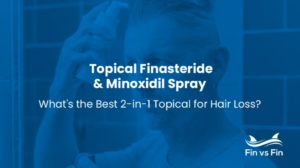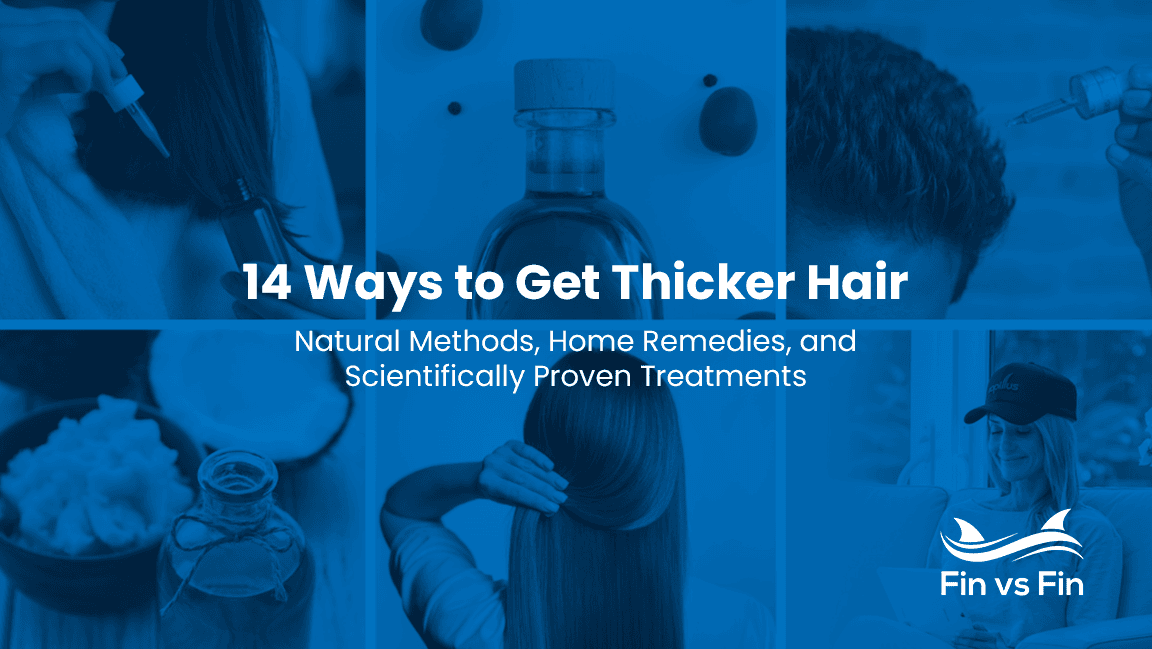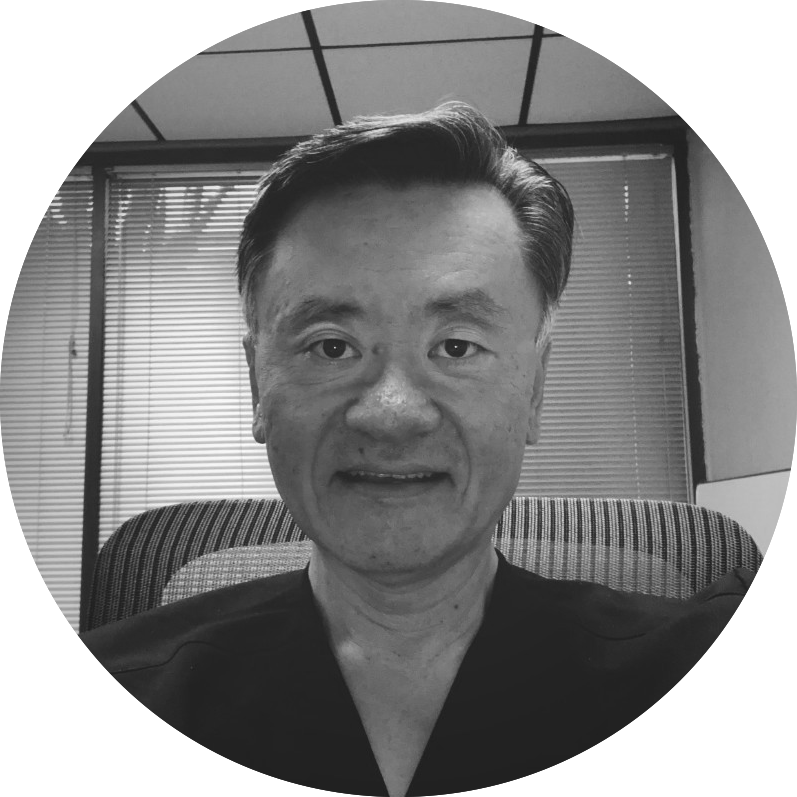There are many ways to make hair thicker and fuller naturally using home remedies, which may be supported by research. In addition, there are scientifically proven ways to grow thicker hair that have been studied much more extensively and are known to be effective for many individuals.
To stimulate hair to grow thicker, you may consider:
- Hair thickening products, such as a thickening shampoo and conditioner
- Choosing a hair pomade that promotes scalp and hair health
- Taking hair supplements
- Ensuring you’re eating a proper diet
- Making a homemade hair mask using avocados, olive oil, and/or coconut oil
- Adding rosemary oil to the scalp
- Incorporating scalp massage into your daily routine
- Ensuring scalp health by avoiding hair products with certain ingredients, like silicone or phthalates
- Avoiding the use of hot tools everyday
- Managing stress, which can contribute to hair loss and scalp health
- Topical minoxidil (Rogaine), an FDA-approved treatment for male and female pattern hair loss
- Finasteride, an FDA-approved treatment for male pattern hair loss
- Laser caps, an FDA-cleared treatment
- Ketoconazole shampoo, an FDA-approved shampoo that promotes scalp and hair health
In this article, we discuss 14 ways you can promote thicker and fuller hair using natural methods, home remedies, and scientifically proven treatments.
Always consult with your healthcare provider prior to trying any new supplement or medication to ensure that it is safe for you to use.
How to Get Thicker Hair Naturally
Incorporating natural approaches and home remedies into your daily routine may encourage thicker and healthier hair growth, without resorting to harsh chemicals or invasive treatments.
Related reading: Hair Loss Test at Home
Thickening Shampoo and Conditioner
Thickening shampoos and conditioners are specially formulated hair care products designed to add volume and fullness to fine or thinning hair. These products often contain ingredients such as saw palmetto, ginseng, and caffeine, which may promote hair growth, increase hair thickness, and improve scalp health in those with certain hair loss conditions, however, more research is needed.
Hair Pomade
Hair pomades can create the illusion of thicker hair by adding volume and texture. When applied to the hair, pomade coats each strand, making the hair appear fuller and denser. Additionally, certain types of hair pomades use key ingredients, such as saw palmetto and caffeine, that may help stimulate healthy hair growth.
Hair Supplements
Hair supplements typically contain a combination of vitamins, minerals, amino acids, and other nutrients that are believed to be essential for strong, healthy hair. Common ingredients found in hair supplements include biotin, saw palmetto, collagen, zinc, and vitamin C.
While some individuals may experience improvements in hair quality and growth with the use of hair supplements, their effectiveness can vary depending on individual factors and the underlying cause of hair loss or shedding.
Proper Diet
Incorporating a balanced diet rich in vitamins and minerals, such as B vitamins, zinc, iron, and vitamin C, is essential for healthy hair growth. Consuming foods like eggs, nuts, leafy greens, fortified breakfast cereals, oats, yogurt, and fruits may contribute to healthier and thicker hair.
Homemade Hair Mask
Making a homemade hair mask is a simple and natural way to nourish and condition your hair and scalp. This DIY hair mask is packed with vitamins and healthy fats, which may help hydrate and strengthen your hair, adding to your scalp and hair’s overall health.
To do so:
- Mash a ripe avocado and mix it with a tablespoon of honey and a tablespoon of coconut or olive oil. Blend the ingredients thoroughly until you have a smooth mixture.
- Apply the mask to damp hair, ensuring you cover your scalp and hair thoroughly.
- Leave it on for about 20 minutes to allow the nutrients to penetrate the hair follicles.
- Rinse thoroughly with lukewarm water and shampoo as usual.
If you haven’t used these ingredients before, consider patch testing to check for allergies or sensitivities.
Rosemary Oil
According to research, applying rosemary oil to the scalp every day for several months may lead to increased hair growth in individuals who have a hair loss condition. Keep in mind that more research is still needed.
Scalp Massage
Regular scalp massages may improve blood circulation to the hair follicles and stimulate growth. Research notes that having a scalp massage for a few minutes every day may lead to increased hair thickness.
Prioritize Scalp Health
Avoid products with fragrance, silicones, artificial colors, phthalates, ethanol, propyl alcohol, and isopropyl alcohol, as these can dry out and damage the hair follicle and scalp. By checking ingredients carefully, you can ensure overall scalp health, which is directly connected to hair growth and thickness, according to research.
Avoid the Use of Hot Tools Every Day
Hot tools, such as blow dryers, flat irons, and curling irons can cause hair breakage and damage hair overtime. If possible, avoid using these tools every day and use a heat protectant spray to prevent further hair damage. In addition, try to use the lowest heat setting possible when styling your hair, as high heat can weaken hair, and lead to split ends and hair breakage.
Manage Stress
High levels of cortisol, the body’s main stress hormone, are associated with hair loss, as well as scalp dryness. However, managing stress, through techniques like meditation or yoga, can help promote hair and scalp health, while preventing or reducing further hair loss caused by long-term stress.
Scientifically Proven Ways to Grow Thicker Hair
Scientifically proven ways to thicken hair typically revolve around addressing underlying causes of hair thinning and promoting a healthy scalp.
Minoxidil
Minoxidil is an FDA-approved topical medication used to treat male and female pattern hair loss. Offered as a foam or solution, when applied directly to the scalp, minoxidil works by widening blood vessels and increasing blood flow to hair follicles, which can lead to improved follicle function and hair growth. It is believed to extend the growth phase of hair, resulting in thicker and longer hair over time.
Related reading:
Finasteride
Finasteride is an FDA-approved oral medication used to treat male pattern hair loss. It works by inhibiting the enzyme 5-alpha-reductase, which converts testosterone into dihydrotestosterone (DHT), a hormone associated with hair loss. By reducing DHT levels, finasteride helps slow down hair loss and promotes hair growth and hair thickness in some individuals.
Related reading:
Laser Caps
Laser caps, also known as laser regrowth caps, are devices that use low-level laser therapy (LLLT) to stimulate hair follicles and promote hair growth. They are designed to be worn on the scalp like a cap and emit red or near-infrared light. This is believed to stimulate blood flow, reduce inflammation, and encourage the production of hair proteins, ultimately leading to thicker and healthier hair. However, more research is still needed on its overall safety.
Related reading: Top 5 Laser Cap Comparison
Ketoconazole Shampoo
Ketoconazole shampoo is an FDA-approved product used to treat scalp conditions, like dandruff and fungal infections. Research notes that, when compared to minoxidil, those who used ketoconazole shampoo showed similar hair growth and hair density improvements, even if the individual did not show any signs of dandruff. This makes it a good potential option for boosting hair thickness and growth, as well as improving overall scalp health.
Frequently Asked Questions (FAQ)
Can thin hair get thicker?
Yes, various treatments or home remedies, such as hair thickening products, minoxidil, rosemary oil, ketoconazole shampoo, laser caps, and stress management may help some individuals get thicker hair. Always speak with your healthcare provider prior to trying any new treatment or medication to ensure that it is safe for you to use.
Is there a way to get thicker hair in a month?
Significant hair growth typically takes time and it’s unlikely that you’ll see a dramatic change in hair thickness in just one month. However, there are some steps you can take to promote overall hair and scalp health, including prioritizing scalp care, avoiding hair products that use certain drying ingredients, reducing the use of hot tools, reducing stress levels, consuming a proper diet, and choosing hair thickening products.
How can I stimulate my hair to grow thicker?
Incorporating scalp massage, using hair thickening products, trying a homemade hair mask, addressing any nutritional deficiencies, encouraging scalp health, and minimizing stress may help stimulate hair to grow thicker. If home remedies don’t work, it’s best to speak with your healthcare provider to see if there are any underlying conditions that may be impacting your hair growth.
Read More Health Reviews

Wisp BV Reviews – Is It Worth It for Bacterial Vaginosis & Other Infections?
Wisp Bacterial Vaginosis Treatment Overview Cost: $9 to about $33 per month Rx medications: Metronidazole tablets/gel, clindamycin tablets/cream OTC remedies: Boric acid suppositories, probiotics Potential side effects: Stomach upset, cramps, lost appetite, headache, constipation, diarrhea, nausea, dry mouth Other conditions treated: UTI, yeast infection, vaginal

Wisp Herpes Review 2024 – Does It Work for Oral and Genital Sores?
Wisp Herpes Treatment Overview Cost: $9 to $35 per month Treatments for: Cold sores and genital herpes, episodic or suppressive therapy Rx medications: Valacyclovir and acyclovir pill, acyclovir cream (10%), lidocaine-amitriptyline cream OTC remedies: L-lysine capsules, all-natural antiviral herbal supplements Potential side effects: GI discomfort,

Topical Finasteride and Minoxidil Spray Review – What’s the Best 2-in-1 Topical for Hair Loss?
If you’ve been looking into treatment for pattern hair loss (androgenic alopecia), you may have come across the ingredients minoxidil and finasteride, which are the two most popular and clinically-backed treatments for thinning hair that come in both oral and topical form. Brands like Hims,

How to Keep Your Balls From Shrinking While on Testosterone
Key Takeaways Testicular shrinkage is a known, but avoidable side effect of TRT. Studies show that other treatments, like human chorionic gonadotropin (hCG) and Clomid (clomiphene), can prevent or reverse shrinkage when taken alongside TRT. Enclomiphene, a TRT alternative, can boost your body’s natural testosterone

Tretinoin and Hair Loss: Does It Help Regrow Hair?
Key Takeaways Topical tretinoin may support hair growth by increasing circulation to the scalp and boosting cell turnover. Up-to-date clinical research indicates that tretinoin can enhance the effects of minoxidil for hair growth. The most common side effects of tretinoin are skin irritation, dryness, and

Keeps ED Review – Do Their Personalized Treatments for Erectile Dysfunction Work?
Keeps ED Meds Overview Cost: Starts at $3.20 per dose What’s prescribed: Sildenafil, tadalafilDosage: Varies Potential side effects: Cough, headache, heartburn, nausea, and more Who qualifies: US-based individuals experiencing symptoms of erectile dysfucntion (ED) FDA information: FDA-approved medications Insurance information: Does not accept Try Keeps















